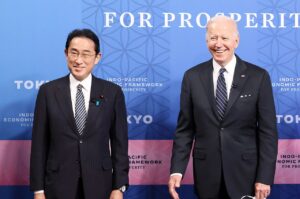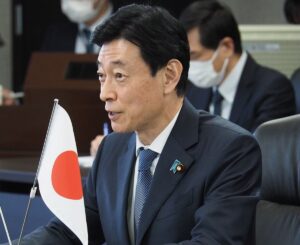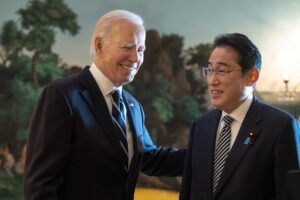Editor’s Note
Since 2013, Stimson’s Japan Program has been collaborating with the Embassy of Japan in Washington DC for a publication series entitled “Views from the Next Generation,” which is a collection of essays by up-and-coming Japanese policy experts on the issues that Japan sees as its national security policy priorities. Given the dramatic developments in Japan’s security policymaking, including the modernization of its key strategic documents in December 2022, the last few years of this series have shifted its focus to introducing the analyses of leading Japanese policy experts on these issues.
Between January-March 2024, Stimson recruited four prominent policy experts and asked them to shed light on the evolution of approaches to the four key issues, all of which have been identified in the 2022 National Security Strategy as Tokyo’s priorities—visition for Japan’s role in the international order, alliances and partnership, nuclear disarmament vs deterrence, and economic security. Some of these experts have experience as practitioners, and others have served in the Government of Japan’s advisory commission. We hope these essays shed light on the most up-to-date trendline on the key foreign policy issues in Japan.
– Yuki Tatsumi, Senior Fellow & Director, Japan Program
Japan’s Nuclear Conundrum
Japan’s nuclear policy, formed in the 1960s, is anchored on four fundamental pillars that continue to shape its approach to this day, as outlined by then-Prime Minister Eisaku Sato. First, Japan has adopted and upheld the Three Non-Nuclear Principles, in which Japan pledged non-possession, non-production, and non-introduction of nuclear weapons; second, in diplomacy, Japan has advocated for nuclear disarmament through efforts to maintain the nuclear non-proliferation regime based on the Treaty on the Non-Proliferation of Nuclear Weapons (NPT); third, Japan has depended on the U.S. extended nuclear deterrence as an integral part of its security against threats from the periphery; and fourth, the research, development, and use of nuclear energy are limited to peaceful purposes per the Atomic Energy Basic Act. These four pillars of nuclear policy have been shaped by three key factors: the traumatic experience of the atomic bombings of Hiroshima and Nagasaki, the security threats from neighboring nuclear powers, and energy security concerns, as Japan’s dependence on foreign energy supplies exceeds 90%, leading it to choose the path of utilization of nuclear energy and nuclear fuel cycle.
As a result of this policy, Japan faces two nuclear dilemmas. The first dilemma is that, while promoting policies that strongly support nuclear nonproliferation and nuclear disarmament, Japan has pursued the nuclear fuel cycle to improve its energy security, which has led other countries to view Japan as a proliferation risk itself. The second dilemma is that while promoting nuclear disarmament and the realization of the ideal of a “world without nuclear weapons,” Japan relies on the extended nuclear deterrence provided by the United States to deal with threats to its own security.
Since February 2022, when the Russian invasion of Ukraine began, there has been a lively discussion in Japan about the need to pursue “nuclear sharing” with the United States. According to an opinion poll jointly conducted by Sankei Shimbun and Fuji News Network in March 2022 indicated that nearly 85% of respondents expressed support for discussing (not seeking) nuclear sharing. Even though this results need to be taken with a grain of salt given that the poll was conducted by comparatively conservative news outlets, the result nonetheless suggests that doubts about the credibility of extended U.S. nuclear deterrence have increased. At the same time, it also indicates that the Japanese public is demanding a stronger commitment to the U.S.-Japan alliance in the face of growing nuclear risks, as China and North Korea rapidly increase their nuclear capabilities.
On the other hand, Japanese public opinion toward nuclear disarmament remains strong, even as the strategic environment deteriorates with increasing nuclear risks. In an online survey conducted in January 2023 (report forthcoming), 70% support the idea of promoting nuclear disarmament, and 70% support Japan joining the Treaty on the Prohibition of Nuclear Weapons (TPNW), although the timing of this support varies.
While the Japanese government shares the ultimate goal of the TPNW, it has not joined the treaty and has not even participated as an observer in meetings of the parties to the TPNW, citing the lack of participation by nuclear-weapon states. If Japan were to join the TPNW, it would result in foregoing extended nuclear deterrence from the United States. Even if the alliance were to survive under such circumstances, the means for the United States to exercise its right of collective self-defense would be severely constrained because the United States would be legally unable to retaliate with nuclear weapons on behalf of Japan, which could further risk its own forces and nation.
Another possible divide in the alliance, which could arise from Japan’s participation as an observer in TPNW meetings, may be that Japan, as it continues to pursue a nuclear-free world, may find itself in conflict between its desire to advocate nuclear disarmament and its eagerness to strengthen its alliance with the United States. As Tokyo’s alliance with Washington gets closer as the cooperation between Japan’s Self-Defense Force and the U.S. military deepens, it becomes more difficult for Tokyo to explain how it can advocate for a nuclear-free world on one hand while continuing to rely on U.S. extended nuclear deterrence for its own security on the other.
For the Japanese public, however, the psychological hurdle to the use of nuclear weapons is high. For example, according to the aforementioned online survey, approximately half of respondents expect the U.S. to retaliate with conventional forces in the event of an attack on Japan, with nuclear retaliation being the third choice after non-military supportive means. In other words, while they are hesitant about the actual use of nuclear weapons, they recognize the necessity of nuclear weapons for deterrence.
Geopolitical Challenges and Japan’s Posture Toward Nuclear Disarmament
Despite the ambiguity surrounding Russia’s true intentions of its actions amid the war in Ukraine, the international community has perceived a lowering of the threshold for nuclear weapon usage due to several indicators. These include conducting exercises involving the mobilization of missiles capable of nuclear operations amidst rising tensions, as well as disseminating false information concerning Ukraine’s development of weapons of mass destruction (WMD) and the risk of nuclear terrorism. This perception of the lowering threshold for the use of nuclear weapons has influenced policy discussion in East Asian countries, reminding them of greater nuclear risk in the region. These countries are significantly less transparent about their nuclear capabilities, operational policies, and doctrines while also exhibiting political ambitions for acquiring nuclear weapons. The rise of the nuclear sharing debate in Japan and support for the nuclear option in South Korea are precisely the result of the synergistic effects of the quantitative and qualitative rise of nuclear threats in East Asia, coupled with the ongoing war in Ukraine. This situation has led to a growing perception that thresholds for the use of nuclear weapons have been lowered, sparking skepticism about alliance commitments and security assurance promises by the nuclear-weapon states.
In East Asia, this skepticism raises concerns about the increased risk of a contingency over Taiwan or in the Korean Peninsula, which suggests that the risk of regional conflict is under the strong influence of nuclear weapons. In other words, in addition to conventional combat in the land, sea, and air domains, East Asian conflicts would include large-scale missile attacks with ballistic and cruise missiles with improved precision strike capabilities; the development of hybrid warfare, including paramilitary, information warfare, and false flag operations; space, cyber, and electromagnetic domains and unmanned asset strikes using asymmetric weapons may come to be conducted under the long shadow of nuclear weapons.
In such a strategic environment, it is essential for Japan to build a deterrence posture that combines capabilities and cost-imposing measures of deterrence through deterrence by denial and resilience, as well as deterrence by publishment in an integrated manner with the United States and other partner countries, making potential adversaries recognize that it is impossible to achieve strategic objectives by taking military actions. In this context, it is imperative that the United States maintain the credibility of its extended nuclear deterrence.
At the same time, Japan also needs to consider how to improve the situation where nuclear risks remain at a high level; in other words, how to engage China and North Korea through strategic dialogues—and in the future, in arms control for the sake of reducing nuclear risks and nuclear salience in the regional security dynamic.
Japan Needs to Commit to Arms Control Dialogue
China is currently not interested in arms control negotiations with the United States, and the only positive signal is that it has agreed to a dialogue on the impact of artificial intelligence. It is not easy to define the so-called “strategic stability” because the U.S.-China strategic relationship has many asymmetries in terms of nuclear assets, strategic goals, doctrine, and the nature of their involvement in regional security. Since China’s so-called core interests are closely related to regional security, such as Taiwan, the compatibility of U.S.-China stability at the strategic level and stability at the regional level is an indispensable element. Such entanglement at the strategic and regional levels requires Japan to make efforts to deepen dialogue and coordination between the U.S. and Japan on the state of U.S.-China arms control.
In the 1980s, when the U.S. and the Soviet Union were in the process of reaching an agreement on the negotiations for the Intermediate-Range Nuclear Forces (INF) Treaty, Japan made the United States aware of the growing nuclear risk in Asia and provided input for the so-called “zero-zero” option. If there will be a process of pursuing strategic stability between the U.S. and China, it is imperative for Japan to get involved in the process as a party to the regional strategic environment than it did during the INF negotiations.
Nobumasa Akiyama, Ph.D., is the Dean of the School of International and Public Policy and Professor of International Relations at the Graduate School of Law at Hitotsubashi University. He is also an Adjunct Research Fellow at the Japan Institute of International Affairs. He previously served as Minister-Counsellor at the Permanent Mission of Japan to the International Organizations in Vienna, Austria, and as Special Advisor to the Ambassador on Nuclear Security from April 2016 to March 2018 when he was on loan to the Ministry of Foreign Affairs of Japan. His other professional appointments include a member of the Public Security Examination Commission of the Government of Japan, a member of the Eminent Persons Group for the Substantive Advancement of Nuclear Disarmament, a Foreign Minister’s consultative group, and Advisor to the Japanese delegation to the NPT Review Conferences since 2000.




